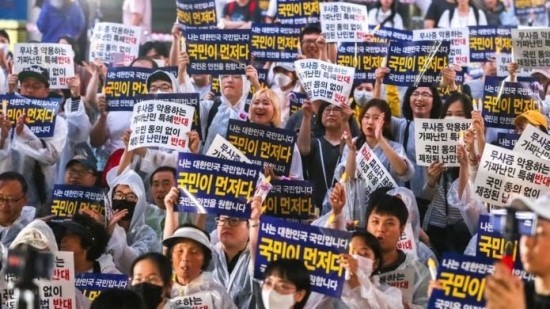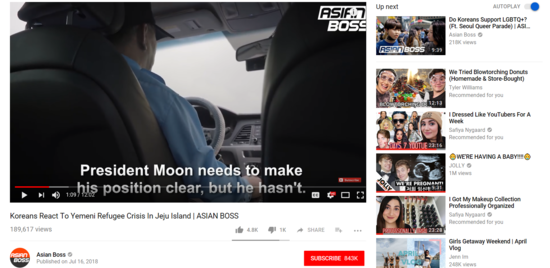In recent months, a controversy developed over the influx of refugees from Yemen through Jeju Island. According to the Department of Justice, 131 Yemeni people applied for refugee status in 2017 and that number has already increased to 552 people in the first half of 2018. This gave rise to an intense debate over whether or not we should continue to accept them. Koreans are concerned that the influx is concentrated in Jeju and this is the first time in Korean history that the tiny island has had to accept a large number of refugees over a brief period of time.
 |
| ▲ People’s resisting refugees are making protests agianst them in Seoul.(From BBC Korea) |
The Arab Spring, which began in 2010, was a series anti-government protests across North Africa and much of the Middle East. It led to many overturned quasi dictatorships including that of the President of Yemen. Ali Abdullah Saleh ruled Yemen for 33 years, but was ousted due to nationwide protests in 2011. The political void needed filling and many contenders were eager to have their shot at governing. After a temporary government was established to bring about new rules for the modern democracy, the Houthi, a major group of people in Yemen, were against the suggested permanent installment of this transitional government and since 2013, have been fighting for control of the nation. When they captured the capital city of Sanaa, the government was forced to flee, leaving many innocent people in the direct path of violence and harm. In 2015, the war stepped up as a multi-national coalition, led by Saudi Arabia, jumped into the fray dropping bombs on Houthi targets in the capital, in support of Yemen’s internationally recognized government. With the war in its third year, many issues like constant bombing, famine, and diseases such as cholera have forced Yemenis to flee from their country.
According to the Korea Institute for International Economic Policy, public opinion regarding the acceptance of refugees deteriorated in Europe after the Islamic State attacks in Paris in 2015. Since the Arab Spring uprisings began, the number refugees seeking asylum in Europe increased to 283,500 people in 2014, a 264.1% increase over the previous year. The European Union accepted the influx of refugees, but the terror events in Paris helped turn public opinion on the policy sour. The main complaint Kim Jung-kwan points out was that it became hard to sort out the genuine refugees from the disguised terrorists.
According to YTN, Yemenis sought shelter in Malaysia because its state religion is Islam, so they believed it would be easier to adapt. In addition, the country provided a 90 day no-visa entry. However, Malaysia has no standards for the acceptance of refugees and does not have the proper support systems in place. In addition, a lack of jobs prevented refugees from earning a living. For these reasons, Yemeni refugees looked for other options. South Korea’s Jeju Island is a signatory to the UN Convention on Refugees meaning asylum seekers can enter the island without a visa and can stay for up to a month. Therefore, Yemeni refugees began arriving in May seeking asylum status. The processing of refugee status is a three step operation. Candidates sign up, their case is heard by a judge and a decision is made to either accept or reject the application. If they are rejected, then the refugee can file an administrative litigation. During this process, applicants can stay in Korea without looking for a job and without restriction of residence for up to 3 years. That means once they apply for refugee status, they don’t need to worry about deportation.
As of now, the country is split on whether or not to accept the refugees. This has sparked a national debate amongst the people and with the government. Some Koreans think that the country should “stick with the rules” and perform their responsibilities by taking in the Yemeni refugees. South Korea is one of the few countries in Asia that are a signatory to the 1951 UN Convention on Refugees and its 1967 Protocol. South Korea also joined the Convention Relating to the Status of Refugees in 1992 and became the first country in East Asia to enact its own refugee law in 2012. Moreover, people needn’t worry about fake refugees coming to Korea as the government already has a strict system and protocol in place for assessing asylum seekers. According to the Ministry of Justice in South Korea, out of the 12,208 asylum applicants since 1992, only 4.2% have been granted acceptance as refugees. At the end of 2014, the acceptance rate increased to 7.3%, which is still relatively low compared to international standards.
Apart from our legal responsibilities, some people also believe that they should help refugees for humanitarian reasons. In an interview conducted and uploaded by Youtuber “Asian Boss”, a Jeju Island resident said we should be accepting these refugees with the same open mind that we have when accepting North Korean refugees. That same resident pointed out that we can never be sure that one day we might need similar help from other countries and we would be devastated if no one was willing to help us.
 |
| ▲ Youtube channel "Asian Boss" conducting a street interview to ask views on the immigrant situation in Jeju island |
However, opponents argue that it is the nation’s responsibility to take care of its own citizens. After seeing the negative press regarding the behavior of some refugees in Europe, including religious cults, rape, stealing and other safety threats, some Koreans are against the acceptance of refugees. They believe that by accepting them, we are “letting a wolf into the cave”.
In reality, Korea also has no historical or political ties to Yemen and refugee agreements are a product of the West feeling some sense of responsibility for world wars. Despite this, Korea has signed on to these Conventions and accepted its responsibilities as a part of the international community. Therefore, we should view it more like humanitarian assistance. Moreover, Korea already accepts up to 3000 North Korean defectors annually and how are they any different to these refugees.
The Dankook Herald interviewed Professor Lim Jae-heong to understand more about the refugee problem. Professor Lim agreed with some of the main opinions of the opponents. There is a lack of support infrastructure and it is difficult to determine which applicants are real and which ones are fake. Lim feels there is a lack of security solutions. However, he also points out that the refugee influx is a new problem for Korean society. It is impossible to predict the flow of refugees. There hasn’t been an influx this high since the Vietnam boat people of the 1970s, so it is to be expected that Korea does not have the necessary infrastructure in place to accommodate the refugees, sort out the legitimate from the fake applicants, nor offer a security solution. However, considering that the refugees from Yemen in Jeju Island are escaping a military clash and extreme poverty, they are highly likely legitimate refugees. He also believes that security systems in Korea are developed enough to overcome this crisis. History shows that societies can thrive with a greater understanding and exposure to different religions, races or languages. When the Jews were escaping persecution in Spain, the Netherlands opened up their borders to the fleeing people. As a result, their nation became stronger. Korea can also benefit from an exposure to a different culture.
Refugees are a hot topic all around the world. There are people who say that we need to accept them for humanitarian reasons, but others insist that opening up the borders to asylum seekers runs counter to the nation’s duty to secure the country for its own citizens. It is clear that both, unconditional admission or total exclusion is impossible. While no country can ignore their humanitarian duties, none have the capacity to accept them all. It is important that however we respond, we act responsibly for the safety and well-being of all those impacted.
정유진, 김동은, Mak Hao Yang dankookherald@gmail.com

![[Campus Magnifier] Let's Surf the Library!](/news/photo/202404/12496_1765_4143.jpg) [Campus Magnifier] Let's Surf the Library!
[Campus Magnifier] Let's Surf the Library!
![[Campus Magnifier] Let's Surf the Library!](/news/thumbnail/202404/12496_1765_4143_v150.jpg)





